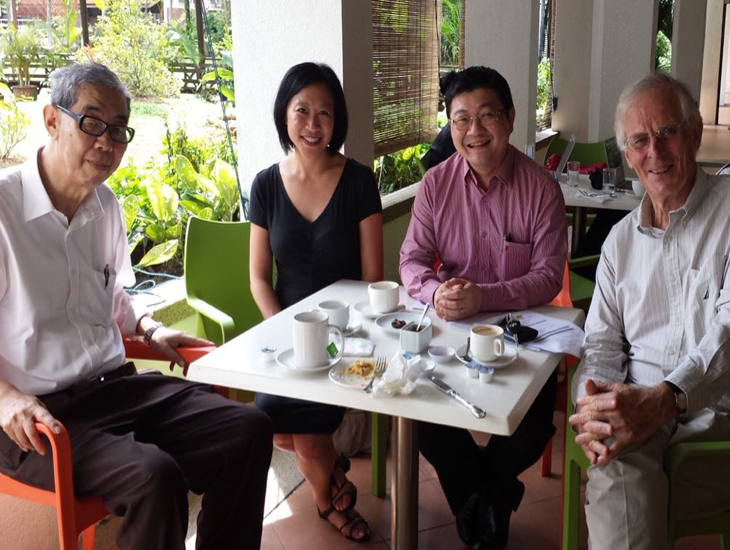Professor Lee Poh Ping, a quiet and effective advisor for Asialink
A tribute to the late Professor Lee Poh Ping by Professor Anthony Milner, International Director, Asialink.
Professor Lee Poh Ping died on Monday 21 November, after a fall – working at the University of Malaya. He was always working in one way or another – analysing international relationships, fostering networks of scholars, mentoring younger academics and debating with us all – some of his work was invaluable to Asialink.
In developing the Asialink Conversations (which bring together influential and lively groups from ASEAN, Australia and elsewhere) and the annual ASEAN-Australia-New Zealand Dialogue (supported strongly by Asialink), Lee gave wise advice and assistance time and time again. He advised on the choice of participants and the topics for discussion; he suggested how to get the best out of people.
When Asialink in 2011 launched upon its ambitious report on Australia and ASEAN, proposing a specific strategy for Australia’s wider engagement with Asia - published as Our Place in the Asian Century: Southeast Asia as The Third Way (Melbourne: Asialink Commission, 2012) – Lee understood that we wanted this to be a different type of project, based upon an unusually close collaboration with ASEAN colleagues. He helped to bring the right group together, and also made a major personal contribution to the report.
Lee judged that Australia could play a larger role with ASEAN. He saw how our close experience with the United States and our Western liberal heritage could be assets, not hindrances in achieving an effective Australian engagement with the region. He was interested also in Korea’s potential to play a very constructive middle-power role – and collaborated with Korean colleagues to promote this objective. In the Australian case, he welcomed Coalition Foreign Minister Downer’s respectful response to the development of ASEAN Plus Three in the late 1990s, and then Australia’s decision to negotiate entry into the East Asia Summit before the United States joined. He was impressed by Foreign Minister Bob Carr’s enthusiasm for ASEAN and his open and receptive manner when interacting with Malaysian policy analysts in Kuala Lumpur. He welcomed the establishing of the ASEAN-Australia-New Zealand Dialogue -which was initiated by his friend Tan Sri Jawhar (on behalf of ASEAN-ISIS), and is now in its ninth year – and had warm relations with a series of senior Australian diplomats in Kuala Lumpur.
Lee was a leading academic in his generation in Malaysia. A graduate of Cornell’s renowned Southeast Asia Program – and a student of Benedict Anderson, the doyen of political scientists working on Southeast Asia – he wrote a powerful, methodologically-innovative study of Chinese society in nineteenth-century Singapore. In later years he focused on international relationships, including Malaysia’s relation to both Japan and China, and also the development of ASEAN and East Asian regionalism. In 2010 he received the ‘Order of the Rising Sun, Gold Rays with Neck Ribbon’: in “recognition of his contribution to the development of Japanese Studies and the advancement of understanding of Japan in Malaysia, and to the promotion of intellectual exchange between Japan and Malaysia”. This is a high award – when Professor Peter Drysdale received one in 2001 it was only the second time an Australian had received a Japanese imperial honour at that level.
Lee, however, never focused on his own achievements; his concern seemed to be with promoting his colleagues and the institutions where he worked. He was deeply interested in his own country – including in Malay history and diplomacy – but was especially determined to maintain the international horizons of the institutions where he worked, at the University of Malaya and University Kebangsaan Malaysia. With his assistance, a long and impressive list of prominent Japanese, Chinese, United States and Australian scholars have spent time in Malaysia – interacting with their Malaysian counterparts. In recent times he was enthusiastic about helping the development of the Asia Europe Institute at the University of Malaya.
Lee’s special support for Asialink arose from this commitment to internationalise research – as well as from his strong belief in an increasingly creative role for Australia in the region – and Asialink has benefited greatly from that commitment.

Image: Lee Poh Ping, ASEAN specialist Alice Ba, foreign policy analyst Kuik Cheng-Chwee and Asialink's Anthony Milner - Lake Club, Kuala Lumpur, 2015